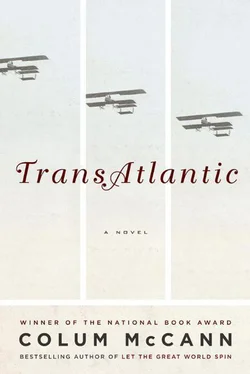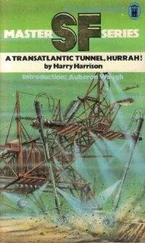— To tell the truth …
He glanced at Webb in the front of the shop. The Quaker was standing at the window, looking out, an overseer. The Liffey seemed to want to carry him away on its continuous sleeve of gray.
— I’d be rather grateful, said Douglass.
— Yes, sir?
He looked out at Webb again.
— If you’d also fit me for a camel’s-hair vest.
— A vest, sir?
— Yes, a waistcoat I believe you call it.
— Indeed, sir.
The tailor turned him around once more, busied himself with a measurement of Douglass’s rib cage, brought the ends of the tape together at his navel.
— You can put it on Mr. Webb’s bill.
— Yes, sir.
— He’s always been fond of a surprise.
THE CROWDS CAME, eager, hatted, earnest. A balloon of perfume about them. They lined the front of the Methodist churches, the Quaker meeting halls, the front drawing rooms of mansions. He stretched up on his toes, put his thumbs in the pockets of his new waistcoat.
In the afternoons he took tea with the Dublin Anti-Slavery Society, the Hibernian Association, the Whigs, the Friends of Abolition. They were well-informed, clever, audacious in speech, generous with their donations. They thought him so very young, handsome, debonair. He could hear the ruffle of dresses in the queue waiting to meet him. Webb said that he had never seen so many young ladies attend the events. Even one or two Catholics from good families. In the gardens of well-appointed houses the women spread their dresses on wooden benches and posed for portraits with him.
Douglass was careful to make sure that he mentioned his wife, his children at home in Lynn. It was odd, but at times the talk of Anna drew the women closer. They hovered. There were giggles and parasols and handkerchiefs. They wanted to know what fashions the free Negro women in America wore. He said that he had no clue, that one dress looked much like the other to him. They clapped their hands together in a delight he could not understand.
He was invited to dinner with the Lord Mayor. The chandeliers in the Mansion House sparkled. The ceilings were tall. The paintings majestic. The rooms led into one another like fabulous sentences.
He met with Father Mathew, joined forces with the temperance movement. The streets of Dublin were full of the demons of alcohol. He took the Pledge. It might, he thought, enamor him of a whole new audience. Besides, he never drank. He did not want to lose control. Too much of the master in it: its desire to sedate. He walked with the Pledge badge worn prominently on the lapel of his new coat. He felt himself to be taller somehow. He drew the gray Dublin air into his lungs. He was seldom left alone. There were always one or two who volunteered to accompany him. He found rhythm in the dips and swerves and repetitions of the Irish accent. He had a penchant for mimicry. Grand day, y’r honor. For the love of God, wouldya ever gi’us sixpence, sir? It delighted his hosts to hear his impersonations. There was a deeper intent there, too: he knew that something so simple could hook a crowd. I am pleased to be in aul’ Ireland .
He was five weeks in Dublin. His face appeared on printed bills around the city. Newspaper reporters met him for high tea in the Gresham Hotel. He was leonine , they wrote, feral, an elegant panther . One paper dubbed him the Dark Dandy . He laughed and tore the paper up — did they expect him to dress in rags of American cotton? He was taken to the Four Courts, brought to the finest dining rooms, asked to sit under chandeliers where he could be properly seen. When he was guided into a room to speak, the applause often extended a full minute. He removed his hat and bowed.
Afterwards they lined up to buy his book. It amazed him to raise his gaze from his fountain pen and see the row of dresses awaiting him.
On certain days he grew tired, thought of himself as an elaborate poodle on a leash. He removed himself to his room, took out the barbells, worked himself into a frenzy.
One evening he found the bill for the waistcoat neatly folded on his bedside table. He had to laugh. They would eventually bill him for every thought he ever had. He wore the camel’s-hair to dinner that evening, casually slipping his thumbs into the pockets as he waited for dessert.
EVERY DAY HE found another word: he wrote them in a small notebook he carried in his inside pocket. Rapacity. Enmity. Phoenician . Words he recognized from The Columbian Orator. Assiduous. Declarative. Tendentious .
When he had first found language, in his boyhood days, it had felt to him like carving open a tree. Now he had to be more careful. He did not want to slip up. He was, after all, being watched by Webb and the others: root, blossom, stem. It was essential to hold his nerve. To summon things into being by the mysterious alchemy of language. Atlantic. Atlas. Aloft. He was holding the image of his own people up: sometimes it was weight enough to stagger under.
IN RATHFARNHAM HE thundered forth. He talked of woman-whippers, man-stealers, cradle-plunderers. Of fleshmongers and swine-drovers. Of sober drunkards, thievers of men. Of limitless indifference, fanatic hatred, thirsty evil. He was in Ireland, he said, to advance universal emancipation, to exact the standard of public morality, to hasten the day of freedom for his three million enslaved brethren. Three million, he said. He held his hands up, as if he cupped every single one of them there, in his palms. We have been despised and maligned long enough. Treated worse than the lowest of low animals. Shackled, burned, branded. Enough of this murderous traffic in blood and bone. Hear the doleful wail of the slave markets. Listen to the clanking chains. Hear them, he said. Come close. Listen. Three million voices!
After his speech, the Gentleman Usher from Dublin Castle took a hold of his arm and breathed whiskey and amazement into his ear. He had never heard such a speech, such fine words put together. For any man to speak in such a way! It was profound, he said, insightful, weighty beyond anything he had experienced before.
— You’re a credit to your race, sir. An absolute credit.
— Is that so?
— And you did not go to school, sir?
— No. I did not.
— And you took no formal lessons?
— No.
— And if you’ll forgive me …
— Yes?
— How do you possibly explain such eloquence?
A hard knot cramped Douglass’s chest.
— Such eloquence?
— Yes? How is it …
— You’ll excuse me?
— Sir?
— I have to run away.
Douglass crossed the room, his shoes clicking loudly on the wooden floor, a smile breaking out as he went.
IN THE AFTERNOONS he caught sight of Lily when she cleaned the upstairs of the house. Just seventeen years old. Her sandy-colored hair. Her eyes ledged with freckles.
He closed his door, sat to write. He could still see her shape. On the stairs he allowed her to pass. A whiff of tobacco came from her. The world was made ordinary again. He walked quickly down to the drawing room where he sat to read the literary journals to which Webb subscribed, the reams of books, the journals. He could lose himself in them.
Lily’s footsteps sounded above him. He was glad when they ceased. He went back upstairs to write. His room had been made spotless and the barbells remained undisturbed.
IN THE BANK on College Green they sent instructions back to Boston to lodge 225 pounds sterling in the accounts of the American Anti-Slavery Society. It amounted to 1,850 dollars. Douglass and Webb emerged in their crisp woolen coats and white linen shirts. There were gulls out over Dublin: as numerous as beggars. In the back of the chanting crowd he saw the young boy with the raw red welts along his neck and face. Hey, Mr. Douglass! the boy screamed, Mr. Douglass, sir!
Читать дальше












